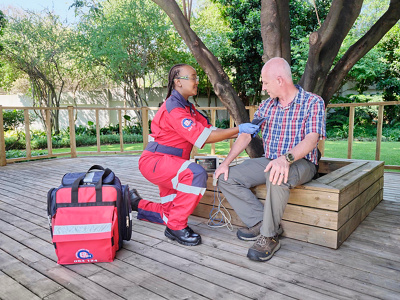A worrying number of South Africans live with hypertension (high blood pressure), which is a significant risk factor for stroke. Ria Earle, an Advanced Life Support Paramedic at ER24 Pretoria, explains the medical reasons for this and how to lower your stroke risk.
The link between high blood pressure and stroke
In South Africa, 45% of men and 48% of women over 15 in South Africa live with hypertension, according to the South African Medical Research Council (SAMRC). This high number is because of factors like bad diets, sedentary lifestyles, high levels of stress, genetics, and an ageing population.
Hypertension means you have high blood pressure (BP) levels, exceeding 140/90 mmHg, Earle explains. “Prolonged and untreated high BP can damage your blood vessels, leading to narrowing, weakening, or even rupturing, especially within the delicate vessels of the brain.”
This damage causes blood clots or restrictive plaques to form, which prevents oxygenated blood flow to your brain and results in tissue death – the hallmark of stroke.
Preventing stroke
Earle says common misunderstandings exist about high BP and the risk of stroke: “Many patients believe that long-term medication usage without side-effects signifies a cure, leading to medication non-compliance,” she adds. “Another misconception is that medication guarantees immunity from complications. Both are simply not true.”
Lifestyle changes are vital to manage hypertension and reduce your stroke risk, she advises. These are the basic requirements for better health:
● Eat a healthier diet
● Cut down on salt
● Quit smoking
● Limit alcohol consumption
● Maintain a healthy weight
● Get regular exercise and stay active.
“Taking these steps can help lower your BP a lot, although you may still need medication. Also see your GP regularly to check how well your medication is working.”
Early stroke intervention saves lives
“I’ve seen many cases where early recognition of stroke symptoms on the scene, together with identifying risk factors such as hypertension, have helped us to pre-notify an appropriate facility,” Earle says. “We can evaluate and test the patient without delay, getting them treatment as soon as possible. This results in minimal to no long-lasting or permanent effects on their quality of life.”
Stroke is a critical medical emergency, where every second counts. ER24’s 24/7 Emergency Contact Centre gives you fast, effective access to our emergency response system. Highly trained operators use advanced dispatching software, mapping technology, and extensive medical databases to coordinate resources, ensure help arrives on time, and ultimately save lives.
For real help, real fast, call ER24 on 084 124 – your partner in emergency care.


